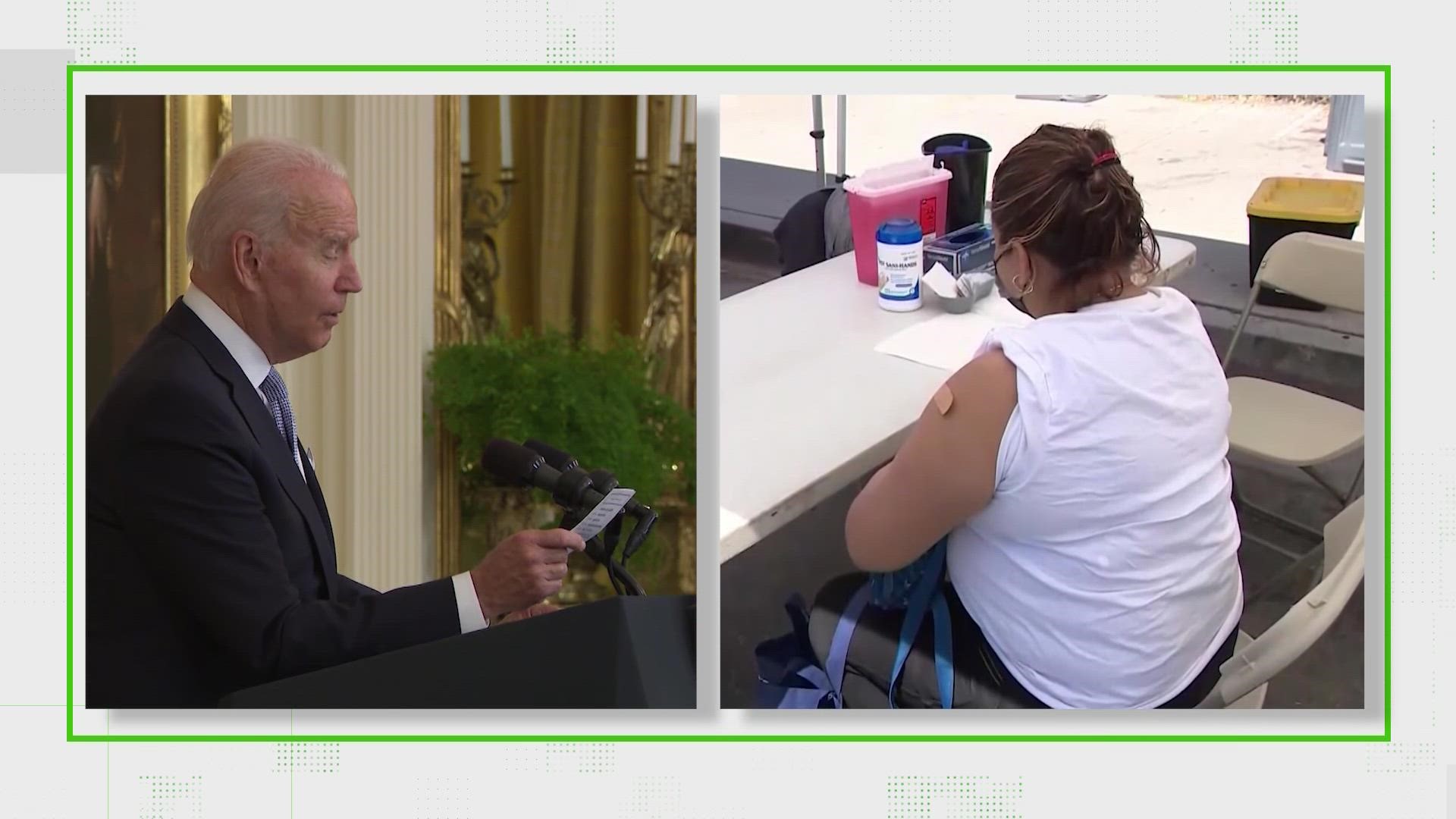President Joe Biden announced on Sept. 9 that the Department of Labor would issue an emergency rule mandating employers with 100+ employees to ensure their workforces are fully vaccinated or show a negative test at least once a week.
The Arizona Attorney General, Mark Brnovich, announced on Sept. 14 he would sue Biden and his administration over the order. He claimed that because “migrants who cross the southern border illegally are not subject to any vaccination requirements even when released directly into the United States” the order reflects “favoritism” for undocumented migrants.
Several viewers have since sent VERIFY questions asking if the White House is mandating vaccinations for migrants in immigration detention facilities.
THE QUESTION
Does the federal government require vaccines for migrants in immigrant detention facilities?
THE SOURCES
- U.S. Immigration and Customs Enforcement (ICE)
- Congressional Research Service (CRS)
- Occupational Safety and Health Administration (OSHA)
- Professor Shefali Milczarek-Desai, director of the University of Arizona’s Workers' Rights Clinic
- U.S. Citizenship and Immigration Services (USCIS)
THE ANSWER
No, the federal government does not require migrants to get vaccinated in immigration detention facilities. ICE says it “cannot force individuals in detention to be vaccinated” but does encourage vaccinations.
WHAT WE FOUND
American federal, state and local governments do not physically force any individual to get any vaccine; they just mandate vaccines at some workplaces and schools.
The World Health Organization says vaccine mandates aren’t truly “compulsory,” meaning they don’t physically force individuals to get vaccinated against their will. A government might require vaccination as a condition for work or school, but it isn’t holding anyone down to vaccinate them. Individuals still have options and even exemptions for declining vaccination. American vaccine mandates don’t apply to individuals, including migrants, outside of the schools or workplaces the mandates specifically apply to.
ICE says it offers COVID-19 vaccines to all individuals detained in its detention centers and encourages them to take the vaccine. This is similar to other federal detention policies, such as the Federal Bureau of Prisons’ policy to offer vaccinations to inmates who “wish to receive it.”
According to ICE’s policy, it “cannot force individuals in detention to be vaccinated.”
A CRS report states that, except for in certain limited circumstances, “no existing federal law expressly imposes vaccination requirements on the general population.” The CRS said the federal government has generally limited its role in vaccination distribution to “promoting, facilitating, or monitoring the use and manufacture of vaccines.”
One of the few places the federal government does have authority to require vaccinations is within the legal immigration system. Certain vaccines, like for polio and measles, are required for anyone to change their immigration status to a permanent legal resident of the U.S., and the USCIS added COVID-19 vaccine to that list, beginning in October. That means any migrant looking to obtain permanent residency in the U.S. will need a COVID-19 vaccination.
The federal government also has the authority to regulate workplace safety, which the Biden Administration plans to use for its vaccine mandate.
“The vaccine requirement that we saw President Biden talk about last week has nothing to do with immigration whatsoever,” said Professor Shefali Milczarek-Desai, director of the University of Arizona’s Workers' Rights Clinic. “So I want to make that clear. That's like talking about apples and oranges. The federal government has very different areas of authority that it uses to regulate immigration versus regulating workplace safety.”
A 1970 law passed by Congress gives the Department of Labor authority to regulate workplace safety through OSHA. So if OSHA declares unvaccinated workers are a threat to workplace safety, it could punish employers who don’t ensure their employees are vaccinated. And OSHA rules cover all employees.
“When the regulation comes out, it's not going to discriminate against U.S. citizens, it's not going to more favorably treat immigrants than native-born workers,” Milczarek-Desai said. “It's going to apply, from what I understand, to all workers. So there is no equal protection issue. There is no discrimination issue.”
OSHA would still have to create exemptions to comply with the Equal Employment Opportunity Commission's anti-discrimination rules, but that wouldn’t take into account an employee’s citizenship. Those anti-discrimination rules protect employees with religious exemptions or medical disabilities.
When Biden announced the incoming vaccine mandate, he said it would require large employers to ensure their workers are fully vaccinated or take part in weekly COVID-19 testing.
That gives workers at large companies with 100 or more employees the option to keep their jobs and refuse the vaccination as long as they agree to COVID testing.
The United States government does not force individuals — migrant or native-born — to get vaccinated. It does require vaccination, including for COVID-19, as a condition for other things, such as public school attendance, employment at certain workplaces and for approval as a permanent legal resident of the U.S.

